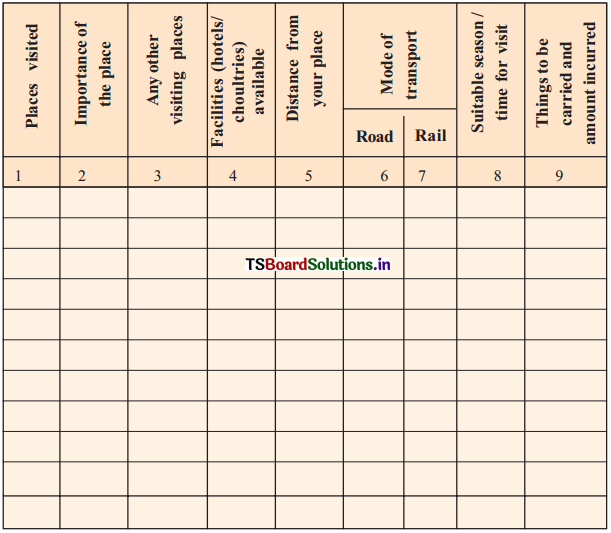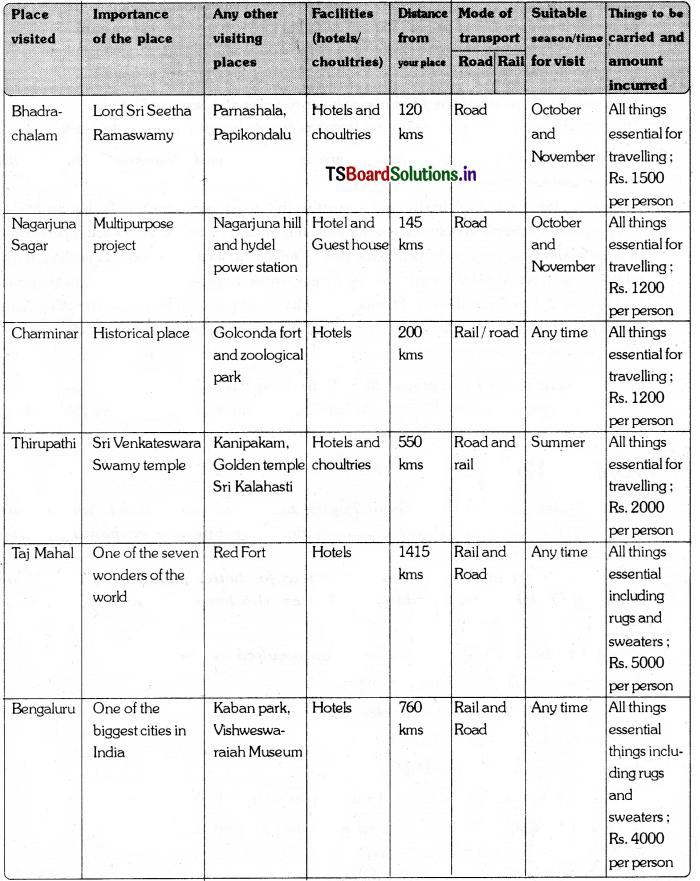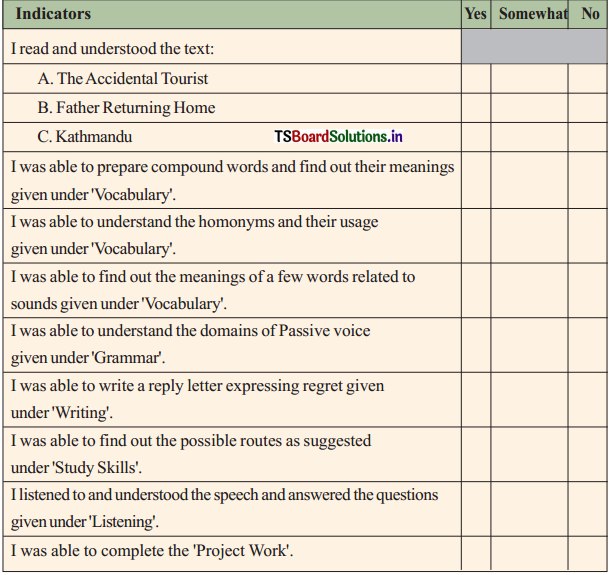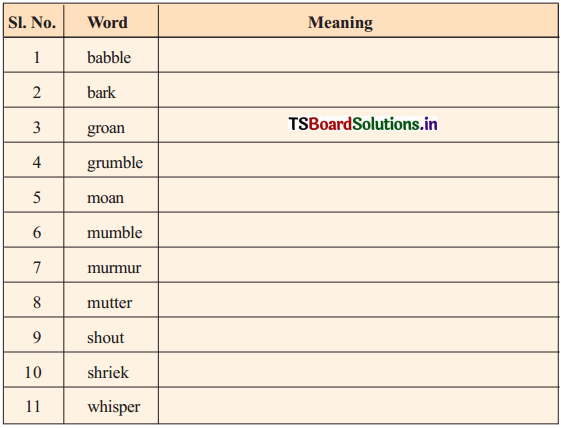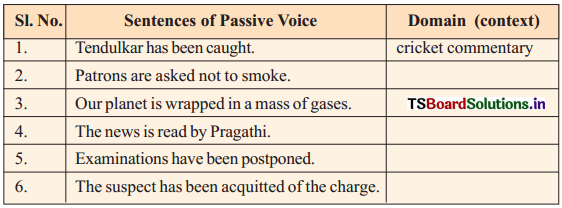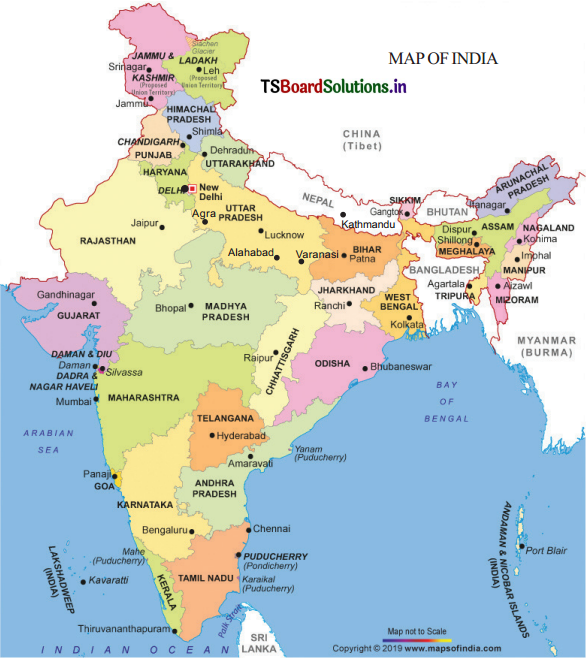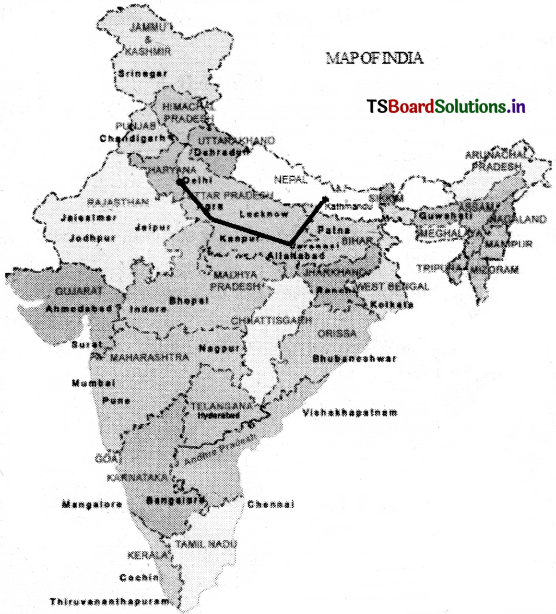These TS 9th Class English Important Questions Reading Comprehension Passages Question Number 1 to 5 will help the students to improve their time and approach.
TS 9th Class English Reading Comprehension Passages Question Number 1 to 5
SECTION – A : Reading Comprehension
Questions : (1 – 5), Marks : 5
Passage – 1:
Read the following passage.
In India working women lead a life of dual responsibilities if they are married and have a family. In the West many women are hard-heacted careerists and are committed to their jobs. Here in India women still have traditional roles to fulfil and prefer a career to avoid domestic drudgery.
There are four categories of working women in India. Some work while they are waiting for matrimony. A majority work because they a ire qualified, want a second income and a different kind of life for part of the day. AS. small section consists of career-women. A sizeable section of women are bread-winners.
It is quite apparent that with a majority of working women the family takes precedence over the job. They prefer to stay in joint families, where their children can be taken care of while they are at work. When they come back in the evenings from the relatively modern surroundings of their work-spots, their personalities have to undergo a change to accommodate the demands of their time and attention by different family members whose predominant feelings are of having been neglected.
These women often do their shopping on the way from office. They reserve their weekends for heavy housework which will help them to cope with t he rest of the week with relatively less tension. Weekends are also reserved for spending time with their spouses and children, for entertainment, family duties, visits am d other such endless chores. Actually speaking they hardly have time for personal needs.
Despite the freedom and confidence of their jobs and pay packets, working women still prefer to leave the financial decision-making and budgeting to their husbands. They are unwilling to compromise on their dual burdens and prefer jobs with flexible timings. They are not unduly fashion-conscious but take pride in graceful clothing. Indian working women are managing their double roles admirably.
![]()
Now, answer the following questions. Each question has four choices.
Choose the correct answer and write the options (A), (B), (C) or (D) in your answer booklet. (3 × 1 = 3 Marks)
Question 1.
Dual responsibilities are the lot of
A) all women
B) all married women
C) all married Indian women
D) all married women in the West
Answer:
C) all married Indian women
Question 2.
Indian married women prefer a career to
A) get relief from routine work
B) become hard-headed careerist s
C) do the work they love
D) be equal to their husbands
Answer:
A) get relief from routine work
Question 3.
The phrase ‘hard-headed’ means
A) having headache
B) determined for a goal
C) hard to be pleased
D) dull and unthinking
Answer:
B) determined for a goal
Answer the following questions in two or three sentences each. (2 × 1 = 2 Marks)
Question 4.
What is more important for a majority of Indian working women ?
Answer:
For a majority of Indian working women family is more important than the job.
Question 5.
What do Indian working women not have practically ?
Answer:
Indian working women have practically no time for personal needs.
![]()
Passage – 2:
Read the following passage.
A Robot about the House
As civilization proceeds in the direction of technology, it passes the point of supplying all the basic essentials of life food, shelter, clothes, and warmth. Then we are faced with a choice between using technology to provide and fulfil needs which have hitherto been regarded as unnecessary or, on the bther hand, using technology to reduce the number of hours of work which a man must do in order to earn a given standard of living.
In other words, we either raise our standard of living above that necessary for comfort and happiness or we leave it at this level and work shorter hours. I shall take it as axiomatic that mankind has, by that time, chosen the latter alternative. Men will be working shorter and shorter hours in their paid employment. It follows that the housewife will also expect to be able to have more leisure in her life without lowering her standard of living. It also follows that human domestic servants will have completely ceased to exist.
Yet the great majority of the housewives Will wish to be relieved completely from the routine operations of the home such as scrubbing the floors or the bath or the cooker, or washing the clothes or washing up, or dusting or sweeping, or making beds.
By far the most logical step to relieve the housewife of routine, is to provide a robot slave which can be trained to the requirements of a particular home and can be programmed to carry out half a dozen or more standard operations (for example, scrubbing, sweeping and dusting, washing up, laying tables, making beds), when so ’ switched by the housewife. It will be a machine having no more emotions than a car, but having a memory for instructions and a limited degree of instructed or built in adaptability according to the positions in which it finds various types of objects. It will operate other more specialized machines, for example, the vacuum cleaner or clothes washing machine.
![]()
Now, answer the following questions. Each question has four choices.
Choose the correct answer and .write the options (A), (B), (C) or (D) in your answer booklet. (3 × 1 = 3 Marks)
Question 1.
The first use of technology is to
A) satisfy the basic needs.
B) lead a life of luxury.
C) have comforts and ease.
D) improve the standard of living.
Answer:
A) satisfy the basic needs.
Question 2.
The author believes that after satisfying the basic needs, mankind will like ?_______
A) to raise the standard of living.
B) to reduce the number of working hours.
C) to do more work.
D) to have more things.
Answer:
B) to reduce the number of working hours.
Question 3.
In the passage the word ‘operation’ means
A) medical operation
B) tasks
C) operant
D) opera
Answer:
B) tasks
Answer the following questions in two or three sentences each. (2 × 1 = 2 Marks)
Question 4.
What will be provided to women by the technology ?
Answer:
The technology will be used to provide women relief from dull routine.
Question 5.
When will domestic servants be disappeared ?
Answer:
Domestic servants will be disappeared when basic human needs are satisfied.
Passage – 3:
Read the following passage.
Oil
Vegetable oil has been known from antiquity. No household can get on without it, for it is used in cooking. Perfumes may be made from the oils of certain flowers. Soaps are made from vegetable and animal oils.
To the ordinary man, one kind of oil may be as important as another. But when the politician or the engineer refers to oil, he almost always means mineral oil, the oil that drives tanks, aeroplanes and warships, motor cars and diesel locomotives; the oil that is used to lubricate all kinds of machinery. This is the oil that has changed the life of the common man. When it is refined into petrol it is used to drive the internal combustion engine.
To it we owe the existence of the motor car, which has replaced the private carriage drawn by the horse. To it we owe the possibility of flying. It has changed the methods of warfare on land and sea. This kind of oil comes out of the earth. Because it burns well, it is used as fuel and in some ways it is superior to coal in this respect. Many big ships now burn oil instead of coal. Because it burns brightly, it is used for illumination; countless homes are still illuminated with oil burning lamps.
Because it is very slippery, it is used for lubrication. Two metal surfaces rubbing together cause friction and heat. But if they are separated by a thin film of oil, the friction and heat are reduced. No machine would work for long if it were not properly lubricated. The oil used for this purpose must be of the correct thickness; if it is too thin it will not give sufficient lubrication, and if it is too thick it will not reach all parts that must be lubricated.
The existence of oil wells has been known for a longtime. Some of the Indians of North America used to collect and sell the oil from the wells of Pennsylvania. No one, however, seems to have realised the importance of this oil until it was found that paraffin oil could be made from it. This led to the development of the wells and to the making of enormous profits. When the internal combustion engine was invented, oil became of worldwide importance.
![]()
Now, answer the following questions. Each question has four choices.
Choose the correct answer and write the options (A), (B), (C) or (D) in your answer booklet. (3 × 1 = 3 Marks)
Question 1.
The oil most talked about is
A) vegetable oil
B) mineral oil
C) animal oil
D) a new oil
Answer:
B) mineral oil
Question 2.
The ‘flying’ has been made possible by
A) mineral oil
B) vegetable oil
C) cooking oil
D) kerosene oil
Answer:
A) mineral oil
Question 3.
‘Film of oil’ means
A) a film about oil
B) smell of oil
C) a thin layer of oil
D) no oil at all
Answer:
C) a thin layer of oil
Answer the following questions in two or three sentences each. (2 × 1=2 Marks)
Question 4.
Where does mineral oil come from ? What does refined mineral oil give ?
Answer:
The mineral oil comes from the earth. The refined mineral oil gives us petrol.
Question 5.
What did the old ships use to burn ?
Answer:
The old ships used to burn coal.
![]()
Passage – 4:
Read the following passage.
Cable TV and Children
Cable TV has come to stay. It has notched a coveted, ‘corner’ in most urban homes today. For some, it is a symbol of social status, for others, a necessity for keeping in tune with the times. Parents have realised that the cable is to be reckoned with. For although the novelty is slowly wearing off, the fascination still remains. So it is no longer a craze, it is a phenomenon.
The impact of cable TV on children is too strong to be ignored. The consequences of the cable phenomenon are slowly beginning to be felt now. Nita is five and very bright. But she has lately failed to progress much with her alphabets. However, her TV vocabulary has been improving with every passing day. She can be heard discussing an ‘extra channel’ with her school friends, who like her have a cable connection at home. Films, Star Plus serials, Wimbledon on Prime Sports and the latest hot numbers on Music TV (MTV) are the current topics of’discussion among children who are getting more and more ‘star’ struck.
Though cable TV brings a new world of sheer entertainment and awareness of a new culture to our homes, yet it has exposed the young to a culture which is alien. It is, therefore, not for the kids with impressionable minds and negative discerning powers. An overloading of information, constant and premature exposure to an unknown culture, no-holds-barred consumerism and a continual, often unchecked, access to adult shows are some of the problems to be reckoned with. Along with, a disturbance of academic routine, curtailment of sports,dreading and other creative ‘pursuits. The price is thus heavy to be paid for.
![]()
Now, answer the following questions. Each question has four choices.
Choose the correct answer and write the options (A), (B), (C) or (D) in your answer booklet. (3 × 1 = 3 Marks)
Question 1.
Cable TV has become
A) a necessity
B) a nuisance.
C) a fact.
D) a novelty.
Answer:
C) a fact.
Question 2.
The word impact
A) is the opposite of pact.
B) means a wrong pact.
C) means the same as impression.
D) means the same as impair.
Answer:
C) means the same as impression.
Question 3.
The discerning power is the power to
A) hear.
B) perceive.
C) talk.
D) feel.
Answer:
B) perceive
Answer, the following questions in two or three sentences each. (2 × 1 = 2 Marks)
Question 4.
What is the effect of cable TV on children and on studies ?
Answer:
The effect of cable TV on children is serious and on studies is negative.
Question 5.
What are the positive points of cable TV and what type of culture does the TV introduce to children ?
Answer:
The positive points of cable TV are entertainment and awareness. The TV introduces the children to a culture which is foreign.
![]()
Passage – 5:
Read the following passage.
The Wild Fauna
Unfortunately, the Pere David deer and the white-tailed gnu are not the only creatures in the world that are nearly extinct. The list of creatures that have vanished altogether and others that have almost vanished, is a long and melancholy one. As man spread across the earth he has wrought the most terrible havoc among the wildlife by shooting, trapping, cutting and burning the forest, and by the callous and stupid introduction of enemies where there were no enemies before.
Take the dodo, for example, the great ponderous waddling pigeon, the size of a goose, that inhabited the island of Mauritius. Secure in its island home, this bird had lost the power of flight since there were no enemies to fly from. And, since there were no enemies, it nested on the ground in complete safety. But, as well as losing the power of flight, it seems to have lost the power of recognizing an enemy when it saw one, for it was apparently an extremely tame and confiding creature.
Then man discovered the dodos’ paradise in-about 1507, and with him came his evil familiars : dogs, cats, pigs, rats and goats. The dodo surveyed these new arrivals with an air of innocent interest. Then the slaughter began. The goats ate the undergrowth which provided the dodo with cover; dogs and cats hunted and harried the old bird; while pigs grunted ‘their way’ round the island, eating the eggs and young and the rats followed behind to finish the feast. But the fat, ungainly and harmless pigeon was extinct – as dead as the dodo.
Now, answer the following questions. Each question has four choices.
Choose the correct answer and write the options (A), (B), (C) or (D) in your answer booklet. (3 × 1 = 3 Marks)
Question 1.
Dodo lived in
A) dense forests.
B) the sea.
C) an island.
D) on the ground.
Answer:
C) an island.
Question 2.
Dodo made its nests
A) high on the hills.
B) inside water.
C) in the trees.
D) on the ground.
Answer:
D) on the ground.
Question 3.
The word ‘melancholy’ in the passage can be replaced by
A) terrible.
B) frightening.
C) sad.
D) thrilling.
Answer:
C) sad.
Answer the following questions in two or three sentences each. (2 × 1 = 2 Marks)
Question 4.
How did the goats harm the dodo ?
Answer:
The goats harmed the dodo by eating the bushes.
Question 5.
Why was dodo not afraid of dogs ?
Answer:
Dodo was not afraid of dogs because it had never seen an enemy.
![]()
Passage – 6:
Read the following passage.
Captian James cook
“I had ambitions not only to go farther than any man had been before; but as far as it was possible for man to go,” wrote James Cook, the explorer, who added Australia and New Zealand to the British Empire.
James Cook, the father of Antarctic exploration, was born in Marton village, Cleveland, on October 28, 1728. From his boyhood, he was interested in seafaring. One day the lad made up his mind; he, too, was going to sea in order to visit glamorous – lands. At the age of twenty-seven, Cook had risen to the proud position of first mate. The first service Cook saw was in Canada, where he was employed in the dangerous task of surveying the St. Lawrence.
When Cook, on August 25, 1768, with a company of eight-three men (including a party of scientists, among whom was the great Sir Joseph Banks) set sail in the Endeavour, they had before them the possibility of filling in a substantial area of the globe’s surface. They reached Tahiti in the spring’of 1769. Cook sailed south on his quest for the unknown continent, and skirting the Society Islands, at length reached New Zealand.
The tattooed natives met them. Cook greeted these Maori warriors with friendly signs and eventually prevailed on them to lay down their spears in sign of truce. After circumnavigating the North and South Islands, Cook surveyed the coastline and landed at Queen Charlotte’s’ Sound. He then hoisted the Union Jack and informed his company that he had taken possession of the inlands on behalf of His Majesty George the Third.
Now, answer the following questions. Each question has four choices.
Choose the correct answer and write the options (A), (B), (C) or (D) in your answer booklet. (3 × 1 = 3 Marks)
Question 1.
James Cook’s chief desire was to
A) discover Australia
B) discover New Zealand
C) travel long and far
D) do something for the British
Answer:
C) travel long and far
Question 2.
‘Substantial’ is the opposite of
A) little
B) much
C) great
D) low
Answer:
A) little
Question 3.
The word ‘surveyed’ in this passage means
A) served
B) inspected
C) found
D) desired
Answer:
B) inspected
Answer the following questions in two or three sentences each. (2 × 1 = 2 Marks)
Question 4.
What was the first challenging job taken by Cook in 1755 ?
Answer:
In 1755, Cook took the first challenging job when he surveyed the St. Lawrence.
Question 5.
What was Cook interested in and what did he discover ?
Answer:
Cook was interested in travelling by boat and he discovered New Zealand.
![]()
Passage – 7:
Read the following passage.
It’s noon in Mumbai on a sweltering summer’s day. Sixty-six-year-old Sarlaben Gandhi is out in the sun shopping for the second time today. Time to buy the bananas.
“Not ripe enough….” Sarlaben tells the banana man, and examines another bunch, “these are too small…. ah, these … these are pukka !” Sarlaben then bargains a bit, grumbles at prices shooting up, and in the end pays Rs. 120 for six dozen bananas.
Why would any suburban grandmother buy so many bananas – and every day ? Sarlaben puts the fruit in a shopping bag, and dodges heavy traffic as she crosses the road and walks about 300 metres to the local Rajawadi Municipal Hospital in Ghatkopar.
There, the waiting room of the antenatal Out Patient Department (OPD) is crowded with pregnant women. Indeed, most of them look malnourished. Sarlaben places her bag on a table and hands out the bananas. The women gratefully accept. “Please do not throw the banana peels on the floor,” says Sarlaben as they begin eating the fruit. “A little later, Sarlaben collects the peels in a plastic bag and leaves for home.
“Most of these women from far and are usually exhausted,” explains Dr Krupa Ashok on duty today, “bananas are a great energy booster.” Indeed, the fruit is rich in potassium, magnesium, vitamins and folate – important during pregnancy.
Sarlaben knows all that. Her husband is a doctor and in her teens she wanted to become a nurse, but couldn’t. “I got married early and had my three girls.” But ten years ago, after the last one of them got married, Sarlaben for the first time in decades found she had plenty of time to spare. She volunteered at a local social service organization and was assigned to serving bananas and snacks at Rajawadi. After a while, Sarlaben decided to do it herself.
So twice a day, five days a week, Sarlaben visits Rajawadi Hospital – actually her “first shift” starts at 10:30 am when she’s in the hospital’s paediatric OPD with biscuits and bread for the kids. There, Sarlaben is on her feet for over art hour and leaves only after every child has eaten. On Saturdays her eldest daughter Chetna usually takes over the task. Sunday is their day of rest, but only because the OPDs are closed.
“How long will you go to hospital and give out bananas ?” I ask Sarlaben.
“For as long as I live,” she smiles.
Now, answer the following questions. Each question has four choices.
Choose the correct answer and write the options (A), (B), (C) or (D) in your answer booklet. (3 × 1 = 3 Marks)
Question 1.
Sarlaben is a
A) social worker.
B) a leader.
C) a politician.
D) a patron of hospitals.
Answer:
A) social worker.
Question 2.
Sarlaben goes to hospital
A) every day.
B) six days a week.
C) five days a week.
D) once a week.
Answer:
C) five days a week.
Question 3.
The phrase ‘on her feet’ means that Sarlaben was
A) without shoes
B) tired
C) standing or walking
D) resting
Answer:
C) standing or walking
Answer the following questions in two or three sentences each. (2 × 1 = 2 Marks)
Question 4.
Why does Sarlaben buy many bananas ?
Answer:
Sarlaben buys many bananas because she wants to give them to pregnant women.
Question 5.
Where does Sarlaben go and at what time does her first shift start ?
Answer:
Sarlaben goes to the hospital situated in Ghatkopar and her first shift of work starts at 10.30 am.
![]()
Passage – 8:
Read the following passage.
Can’t Sleep ? Join the crowd. Millions of people have trouble getting enough restorative shut-eye. With recent research linking lack of sleep to health problems ranging from hypertension to weight gain, there’s more reason than ever to make . over your sleep habits. But how ?
You may have tried medication. You know to stay away from saboteurs like caffeine, nicotine and alcohol. And you’ve probably heard it’s not wise to exercise too vigorously or eat too big a meal a couple of hours before bedtime.
Let Go of Your Worries. Anxieties often seem magnified in the still of the night. Dealing with them can help you sleep. Just writing down worries, deadlines or to-dos before hitting the pillow can make them feel more manageable.
Db whatever helps you relax. Try simple yoga exercises, like the forward bend. Standing with your legs hip-width apart, bend at your waist, letting your arms and head dangle while releasing the tension in your neck and shoulders. Or while lying on your back, do progressive muscle relaxation, tensing and then releasing body parts, beginning with your feet and progressing towards your forehead.
Cut the Light at Night. Avoid bright light, which signals the brain to be alert, within two to three hours of bedtime or if you wake up during the night. Michael Breus, suggests aiming for no more than 45 to 60 watts of light in the room when winding down before dedtime, and no more than 30 to 40 watts of indirect light when you’re trying to sleep. Use low wattage or shielded night-lights in hallways and bathrooms. Make sure your bed is out of the way of direct sunlight, moonlight or streetlights.
Help cement the sleep-wake cycle by exposing yourself to bright light within an hour of waking up for the day, either by taking a 30-minute walk outside or by lingering in a part of the house that gets a lot of sunlight.
Follow the 20-Minute Rule. If you can’t fall asleep in about 20 minutes, whether at bedtime or after awakening in the night, go into another room and do something else until you get drowsy. “The bedroom needs to be associated with sleeping, not with being restless.” Estimate the 20 minutes; don’t use a clock or watch, which causes alertness and possible stress.
Avoid things requiring concentration, such as video games; stimulating activities, like vigorous exercise or cleaning; or anything upsetting, like watching the news or paying bills. Try light reading or listening to music.
Re-do Your Bedroom. Make your bedroom more sleep-friendly, if noise from an adjacent room keeps you up, move your bed to another wall. Replace a sagging mattress and deflated pillows. If you must keep a computer switched on in the bedroom, cover the green light on the monitor’s switch with black electrical tape. If you insist on falling asleep with the TV on, use a timer.
![]()
Now, answer the following questions. Each question has four choices.
Choose the correct answer and write the options (A), (B), (C) or (D) in your answer booklet. (3 × 1 = 3)
Question 1.
Lack of sleep is linked to
A) tension.
B) wealth
C) good health.
D) Wine
Answer:
Question 2.
The worries can be made manageable by
A) brooding.
B) playing
C) reading.
D) writing
Answer:
D) writing
Question 3.
According to the author, yoga can help in
A) being healthy.
B) sleeping.
C) concentration.
D) perceiving.
Answer:
B) sleeping.
Answer the following questions in two or three sentences each. (2 × 1 = 2 Marks)
Question 4.
What are the things requiring concentration to be avoided ?
Answer
Video games, stimulating activities, like vigorous exercise or cleaning; or anything upsetting, like watching the news or paying bills.
Question 5.
What are the tips mentioned in the passage to have a good sleep 7
Answer
- To do yoga
- To cut the light at night
- To follow the 20-minute rule
- Re-do your bedroom
![]()
Passage – 9:
Read the following passage.
The train for Gaya left at 8 p.m. and when that evening 1 returned to the bungalow a little before that hour, I found Lalajee with freshly washed clothes, and a bundle in his hand a little bigger than the one he had arrived with, waiting in the veranda to say goodbye to me. When I put a ticket for Gaya and five one hundred rupee notes into his hand he, like the man with the coalgrimed face, was tongue-tied. All he could do was to keep glancing from the notes in his hand to” my face, until the bell that warned passengers the train would leave in five minutes rang; then, putting his head on my feet, he said, ‘Within’one year your slave will return you this money’.
And so Lalajee left me, taking with him the greater part of my savings. That 1 would see him again I never doubted, for the poor of India never forget a kindness; but the promise Lalajee has made was, I felt sure, beyond his powers of accomplishment. In this I was wrong, for returning late one evening I saw a man dressed in spotless white standing in my veranda. The light from the room behind him was in my eyes, and I did not recognize him until he spoke.
It was Lalajee, come a few days before the expiry of the time limit he had set himself. That night as he sat on the floor near my chair he told me of his trading transactions, and the success that had attended them. Starting with a few bags of grain and being content with a profit of only four annas per bag he had gradually, and steadily, built up his business until he was able to deal in consignments up to thirty tons in weight, oh which he was making a profit of three rupees per ton.
His son was in a good school, and as he could now afford to keep a wife he had married the daughter of a rich merchant of Patna; all this he had accomplished in a little under twelve months. As the time drew near for his train to leave he laid five one-hundred rupee notes on my knee. Then, he took a bag from his pocket, held it out to me and said, “This is the interest, calculated at twenty five per cent, that I owe you on the money you lent me’. I believe I deprived him of half the pleasure he had anticipated from his visit when I told him it was not our custom to accept interest from our friends.
![]()
Now, answer the following questions. Each question has four choices.
Choose the correct answer and write the options (A), (B), (C) or (D) in your answer booklet. (3 × 1 = 3 Marks)
Question 1.
Lalajee was a
A) clerk.
B) salaried person.
C) trader.
D) officer.
Answer:
C) trader.
Question 2.
The author gave Lalajee
A) five hundred rupees.
B) five thousand rupees.
C) all his savings.
D) no money.
Answer:
A) five hundred rupees.
Question 3.
When the author did not accept interest from him, Lalajee was
A) happy.
B) sad.
C) angry.
D) excited.
Answer:
B) sad.
Answer the following questions in two or three sentences each. (2 × 1 = 2 Marks)
Question 4.
What did Lalajee promise ?
Answer:
Lalajee promised to return the author’s money within one-year.
Question 5.
What did the author feel ?
Answer:
The author felt that the poor of India were grateful.
![]()
Passage – 10:
Read the following passage.
I had read of Addison that he began his maiden speech in the House of Commons \ repeating ‘I conceive’ three times, and when he could proceed no further, a wag stood up and said, “The gentleman conceived thrice but brought forth nothing’. I had thought of making a humorous speech taking this anecdote as the text. I therefore began with it and stuck there. My memory entirely failed me and in attempting a humorous speech I made myself ridiculous. “I thank you, gentlemen, for having kindly responded to my invitation,’ I said abruptly, and sat down.
It was only in South Africa that I got over this shyness, though I never completely overcame it. It was impossible for me to speak ‘impromptu’. I hesitated whenever I had to face strange audiences and avoided making a speech whenever I could. Even today I do not think I could or would even be inclined to keep a meeting of friends engaged in idle talk.
I must say that, beyond occasionally exposing me to laughter, my constitutional shyness has been no disadvantage whatever. In fact I can see that, on the contrary, it has been all to my advantage. My hesitancy in speech, which was once an annoyance, is now a pleasure. Its greatest benefit has been that it has taught me the economy of words, I have naturally formed the habit of restraining my thoughts. And I can now give myself the certificate that a thoughtless word hardly ever escapes my tongue or pen. I do not recollect ever having had to regret anything in my speech or writing. I have thus been spared many a mishap and waste of time. Experience has taught me that silence is part of the spiritual discipline of a votary of truth.
Proneness, to exaggerate, to suppress or modify the truth, wittingly or unwittingly, is a natural weakness of man, and silence is necessary in order to surmount it. A man a few words will rarely be thoughtless in his speech; he Will measure every word. We find so many people impatient to talk. There is no chairman of a meeting who is not pestered with notes for permission to speak.
And whenever the permission is given the speaker generally exceeds the time limit, asks for more time, and keeps on talking without permission. All this talking can hardly be said to be of any benefit to the world. It is so much waste of time. My shyness has been in reality my shield and buckler. It has allowed me to grow. It has helped me in my discernment of truth.
![]()
Now, answer the following questions. Each question has four choices.
Choose the corned answer and write the options (A), (B), (C) or (D) in your answer booklet. (3 × 1 = 3 Marks)
Question 1.
The author wanted to make
A) a learned speech.
B) a humorous speech.
C) no speech.
D) a motivating speech.
Answer:
Question 2.
The author did not like to make
A) a speech.
B) a poem.
C) good talk.
D) idle talk.
Answer:
Question 3.
The author says that shyness has been
A) a disadvantage to him.
B) an advantage to him.
C) no disadvantage to him.
D) a great weakness.
Answer:
Answer the following questions in two or three sentences each. (2 × 1 = 2 Marks)
Question 4.
What is the common thing between the author and Addison ?
Answer:
The common thing between the author and Addison is that both failed in their maiden speech.
Question 5.
What does the author believe ?
Answer:
The author believes that it is a good habit to be a man of few words.
